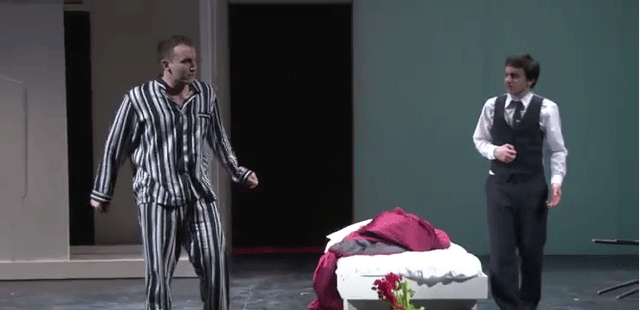Colgate’s Theater Talent Shines Through in Rhinoceros
From Wednesday, April 5 to Saturday, April 9, at Brehmer Theater, the Colgate Department of Theater performed Eugene Ionesco’s “Rhinoceros.”
Ionesco was a major figure in the Theatre of the Absurd, a French dramatic
movement that focused on the absurdity of the modern human condition. Written in 1959, “Rhinoceros” examines the life of Berenger, a man caught up in the tumult of conformity, violence and meaninglessness in his town.
The play presents an onslaught of humans turning into rhinoceroses, caught up in absurd conversation around the occurrences in their daily lives. Looking deeper, it metaphorically represents the mass conversion to Nazism and fascism faced by people during the World War II era.
First-year Steven De Vellis played the part of the logician, a man who tried to apply logic to understanding the confusion and uprising faced by the town. His role showed that it was nearly impossible to try to comprehend the absurd mentality of those who joined the cause, and people drove themselves crazy trying to justify the reasons for the rhinoceros appearances.
Senior Lecturer in the University Theater at Colgate, Simona Giurgea, directed the play. She was born in Romania and moved to the United States in 1995.
“After talking to students and consulting with my colleagues in the Theater
Department, I chose to direct ‘Rhinoceros’ by Ionesco in October last year. As I lived in a communist country for 29 years, I’ve always been fond of Ionesco’s plays: they satirize conformism, hypocrisy and cowardice, and bring forth existential questions. I find the play to be speaking in unmediated terms to the times of moral ambiguity we live in. An absurdist play addresses directly the infatuation with form at the expense of content, and I believe this is a pertinent issue today,” Giurgea said.
First-year Haoqi Xia played the part of Gentleman in Rhinoceros. He enjoyed the deeper themes of the play and appreciated the opportunity for everyone to work together to become better actors.
“I’m convinced that this is a genius play. However, being an actor in such a
sophisticated play has not been easy for me. In order to make sense of each line in this ‘absurd’ play, and then to deliver my interpretation to the audience in a clear way, it requires much individual dedication as well as group effort. Many chaotic images depicted by Ionesco’s words demand very tight connections among actors on stage,” Xia said.
By the end of the play, everyone except Berenger eventually transformed into
rhinoceroses, filled with rage and losing touch with humanity. It was a frightening portrayal of the human capacity for evil and carelessness, as it seems all of the characters except Berenger completely lost their resolve to fight for what they believe in and instead succumbed to the norm. Berenger spoke to both the pride and shame that accompanies being different. Although he felt disgusting because of his otherness and his differences from the rhinoceroses, he realized that he was too strong to conform, and he had to stay true to his mind and heart.
Sophomore John Bennett enjoyed the play, especially the rhinoceros costumes and exciting set design.
“I really enjoyed how the set and lighting worked to allow for the message to be portrayed. Especially how the rhinos became increasingly more visible throughout the play which worked to show how ‘the disease,’ fascism, became increasingly normalized,” Bennett said.
“It’s been a rewarding experience for me to be in this production, in which I learned so much about acting techniques as well as what a group effort means. I’m extremely proud of the entire cast that we conquered such a challenging play,” Xia said.
Giurgea echoed Xia’s sentiments about the challenging nature of the play, but she was also enticed by its valuable lessons and clever undertones.
“It’s a challenging play to direct and that was also attractive to me. In directing Ionesco, or any other student production, my responsibility is the same: to create the space in which theater can happen. I’m happy to learn that you enjoyed the production, as ultimately it is the audience that makes the work become play,” Giurgea said.







